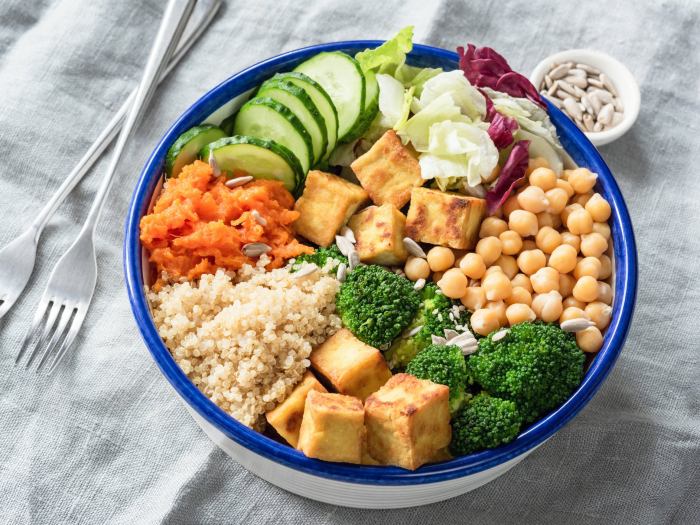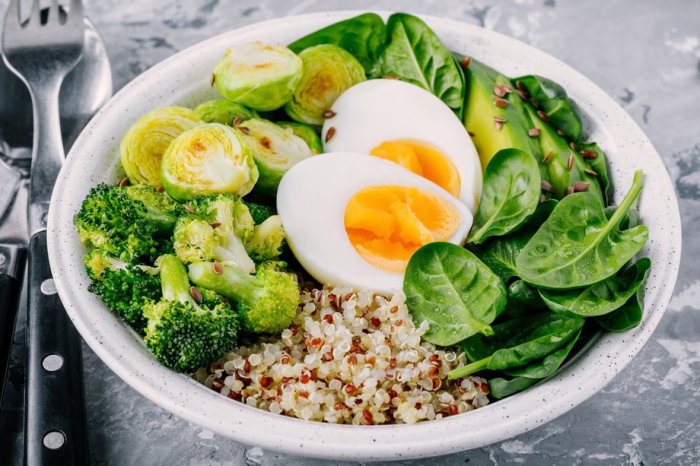How healthy is a vegetarian diet? This question has sparked debates and discussions for years, and it’s time to delve into the heart of this topic, exploring the nutritional advantages, potential drawbacks, and everything in between. As we navigate the complexities of plant-based eating, let’s uncover the truth about vegetarian diets and their impact on our health and well-being.
Vegetarian diets, characterized by the exclusion of meat, fish, and poultry, have gained popularity due to their potential health benefits, ethical considerations, and environmental concerns. But what does the science say about their nutritional value? Let’s explore the evidence and separate fact from fiction.
Health Benefits of a Vegetarian Diet

Embracing a vegetarian diet offers an array of health benefits, primarily due to the increased consumption of nutrient-rich fruits, vegetables, and whole grains. These plant-based foods are packed with vitamins, minerals, antioxidants, and fiber, contributing to overall well-being.
Vegetarian diets have been associated with a reduced risk of chronic diseases such as heart disease, stroke, and type 2 diabetes. The high fiber content in plant-based foods helps regulate blood sugar levels, reducing the risk of developing type 2 diabetes.
Additionally, the antioxidants and anti-inflammatory compounds found in fruits and vegetables help protect against heart disease and stroke.
Reduced Risk of Chronic Diseases
- Heart disease: Vegetarian diets have been shown to lower cholesterol levels and reduce the risk of heart attacks and strokes. This is due to the high fiber content, which helps remove cholesterol from the body, and the presence of antioxidants, which protect against damage to blood vessels.
- Stroke: Vegetarian diets have been linked to a reduced risk of stroke. This is likely due to the high intake of fruits and vegetables, which are rich in antioxidants that protect against damage to blood vessels.
- Type 2 diabetes: Vegetarian diets have been shown to help prevent and manage type 2 diabetes. This is due to the high fiber content, which helps regulate blood sugar levels, and the presence of antioxidants, which protect against damage to cells.
Nutrient Considerations: How Healthy Is A Vegetarian Diet

A vegetarian diet, while offering numerous health benefits, may require careful attention to certain essential nutrients. Vegetarians, particularly vegans, may face a higher risk of deficiencies in specific nutrients, including protein, iron, calcium, and vitamin B12.
It is crucial for vegetarians to understand the importance of these nutrients and adopt strategies to ensure adequate intake.
Protein
Protein is essential for building and repairing tissues, producing enzymes, and transporting nutrients. Plant-based sources of protein, such as beans, lentils, tofu, and nuts, can provide adequate protein when consumed in sufficient quantities.
- Vegetarians should aim for a daily protein intake of 0.8-1 gram per kilogram of body weight.
- Combining different plant-based protein sources throughout the day can help ensure a complete amino acid profile.
Iron
Iron is necessary for producing red blood cells, which carry oxygen throughout the body. Plant-based sources of iron, such as leafy green vegetables, beans, and fortified cereals, have a lower absorption rate than heme iron found in animal products.
- Vegetarians should consume twice the recommended daily intake of iron compared to non-vegetarians.
- Pairing iron-rich foods with vitamin C sources, such as citrus fruits or bell peppers, can enhance iron absorption.
Calcium
Calcium is essential for bone health and plays a role in muscle function and nerve transmission. Dairy products are a rich source of calcium, but vegetarians can obtain calcium from fortified plant-based milks, leafy green vegetables, and tofu.
- Vegetarians should aim for a daily calcium intake of 1,000-1,200 milligrams.
- Sunlight exposure and regular weight-bearing exercise can also contribute to bone health.
Vitamin B12
Vitamin B12 is essential for the production of red blood cells and the function of the nervous system. It is primarily found in animal products, so vegetarians, especially vegans, are at a higher risk of deficiency.
- Vegetarians should consider consuming fortified plant-based foods or taking a vitamin B12 supplement.
- Regular monitoring of vitamin B12 levels through blood tests is recommended for vegans.
Types of Vegetarian Diets

Vegetarian diets vary in their level of restrictiveness, with some allowing for the consumption of certain animal products while others exclude all animal-derived foods. Here are the main types of vegetarian diets:
Lacto-Vegetarian Diet
Lacto-vegetarians consume dairy products such as milk, cheese, and yogurt but exclude all other animal products, including eggs, meat, and fish. This diet provides a good source of calcium, protein, and other nutrients found in dairy products.
Embracing a pescatarian life can be a rewarding journey, offering a balanced approach to nutrition while minimizing environmental impact. By incorporating fish and seafood into your diet while abstaining from meat and poultry, you not only support your health but also contribute to sustainable food practices.
Ovo-Vegetarian Diet
Ovo-vegetarians consume eggs but exclude all other animal products. This diet provides a good source of protein, vitamins, and minerals found in eggs. However, it may be lower in calcium and iron compared to lacto-vegetarian or vegan diets.
Embarking on a pescatarian life is a sustainable and healthy way to enjoy the benefits of seafood while reducing your environmental impact. By incorporating fish and other seafood into your diet, you can reap the rewards of omega-3 fatty acids, protein, and vitamins without contributing to overfishing and other harmful practices associated with meat consumption.
Pescatarian Diet
Pescatarians consume fish and seafood but exclude all other animal products. This diet provides a good source of omega-3 fatty acids, protein, and other nutrients found in fish. However, it may be lower in certain nutrients, such as iron and vitamin B12, compared to vegan or vegetarian diets.
Vegan Diet
Vegans exclude all animal products, including meat, fish, eggs, dairy, and honey. This diet is typically rich in fruits, vegetables, whole grains, and legumes. It provides a good source of fiber, antioxidants, and other nutrients but may require careful planning to ensure adequate intake of certain nutrients, such as vitamin B12 and iron.
The suitability of a particular vegetarian diet depends on individual nutritional needs and preferences. Lacto-vegetarian and ovo-vegetarian diets may be suitable for individuals who have difficulty obtaining sufficient protein or calcium from plant-based sources. Pescatarian diets may be suitable for individuals who enjoy fish and seafood and are concerned about obtaining sufficient omega-3 fatty acids.
Vegan diets require careful planning to ensure adequate intake of all essential nutrients.
Environmental Impact
Vegetarian diets have significant environmental benefits compared to meat-based diets. Plant-based food production requires less land, water, and energy, resulting in reduced greenhouse gas emissions.
Land Use
Livestock farming occupies vast amounts of land for grazing and feed production. In contrast, plant-based foods require less space, freeing up land for other uses such as conservation or reforestation.
Water Consumption
Meat production consumes enormous amounts of water, from raising livestock to processing and packaging. Vegetarian diets significantly reduce water usage, contributing to water conservation efforts.
Greenhouse Gas Emissions, How healthy is a vegetarian diet
Livestock production is a major contributor to greenhouse gas emissions, particularly methane and nitrous oxide. Vegetarian diets reduce these emissions by eliminating the need for animal agriculture.
Comparison to Other Diets
Studies have consistently shown that vegetarian diets have a lower environmental impact than omnivorous diets. They produce fewer greenhouse gases, require less land and water, and contribute to biodiversity conservation.
End of Discussion
In conclusion, the healthiness of a vegetarian diet depends on various factors, including the type of diet, individual nutritional needs, and lifestyle choices. While vegetarian diets offer numerous health benefits, it’s essential to ensure adequate intake of essential nutrients. With careful planning and attention to nutrient sources, vegetarians can enjoy a healthy and balanced diet that supports their overall well-being.
Whether you’re considering adopting a vegetarian lifestyle or simply curious about its health implications, this comprehensive guide provides valuable insights and practical advice.
Q&A
Is a vegetarian diet nutritionally complete?
Yes, well-planned vegetarian diets can provide all the essential nutrients required for good health. However, it’s important to pay attention to protein, iron, calcium, and vitamin B12 intake.
Can vegetarians get enough protein?
Yes, vegetarians can obtain sufficient protein from plant-based sources such as beans, lentils, tofu, tempeh, nuts, and seeds. Combining different plant-based proteins throughout the day helps ensure adequate amino acid intake.
Is it difficult to meet iron needs on a vegetarian diet?
Iron absorption from plant-based sources is lower than from animal sources. However, vegetarians can increase iron absorption by consuming iron-rich foods like leafy green vegetables, fortified cereals, and beans, and by pairing them with vitamin C-rich foods.
How can vegetarians ensure they’re getting enough calcium?
Calcium is found in dairy products, but vegetarians can obtain it from fortified plant-based milks, leafy green vegetables, and fortified cereals. Additionally, calcium supplements may be necessary.
Is vitamin B12 deficiency a concern for vegetarians?
Vitamin B12 is primarily found in animal products. Vegetarians, especially vegans, need to be mindful of their B12 intake and consider fortified foods or supplements to prevent deficiency.